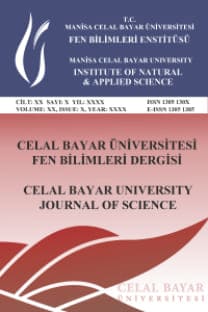The Effects of Mg Deficiency on Activities and Isoenzyme Patterns of Antioxidant Enzymes in Cotton Roots
Magnesium (Mg) is an essential nutrient that takes vital roles in biochemical processes related to energy metabolism, regulation of enzyme activity, nucleic acid biosynthesis and carbohydrate metabolism. Mg deficiency in arable lands is an emerging problem. Loss of balance in different metabolic pathways due to Mg deficiency causes increased production of reactive oxygen species (ROS) such as O2.-, H2O2 and HO. in the roots. The aim of this work was to elucidate the antioxidant response of roots of cotton (Gossypium hirsutum) to Mg deficiency. For this aim, antioxidant enzyme activities were measured and changes in their isoenzymes were determined. In addition, NADPH oxidase (NOX) activity was investigated to determine the changes in ROS signaling. Moreover, H2O2 and lipid peroxidation levels were also measured as an indicator of oxidative damage. Findings of this work indicate that Mg deficiency does not cause oxidative load in roots of Gossypium hirsutum plants that overwhelms cellular antioxidant defence system, as evident by H2O2 and TBARS levels. However, to adjust to the new redox status, root cells drastically downregulate NOX dependent ROS production and induced total superoxide dismutase activity. These findings indicate that site of O2.- production is mitochondria in roots. Although, catalase and ascorbate peroxidase activities were decreased with Mg deficiency induced peroxidase activity seems to limit H2O2 accumulation. These adaptive responses and changes in antioxidant defence were sufficient to prevent excess ROS accumulation and occurrence of oxidative damage in roots of Gossypium hirsutum plants under Mg deficiency
Keywords:
antioxidant enzymes, cotton, Gossypium hirsutum, magnesium deficiency, reactive oxygen species, Antioxidant defense system reactive oxygen species,
___
- 1. Cakmak, I, Yazici, AM. 2010. Magnesium: a forgotten element in crop production. Better Crops; 94: 23-25.
- 2. Özgür Uzilday, R, Uzilday, B, Yalcinkaya, T, Türkan, İ. 2017. Mg deficiency changes the isoenzyme pattern of reactive oxygen species-relatedenzymes and regulates NADPH-oxidase-mediated ROS signaling in cotton. Turkish Journal of Biology; 41(6): 868-880.
- 3. Mittler, R. 2017. ROS are good. Trends in Plant Science; 22(1): 11-19.
- 4. Tewari, RK, Kumar, P, Tewari, N, Srivastava, S, Sharma, PN. 2004. Macronutrient deficiencies and differential antioxidant responses—influence on the activity and expression of superoxide dismutase in maize. Plant Science; 166: 687-694.
- 5. Tewari, RK, Kumar, P, Sharma, PN. 2006. Antioxidant responses to enhanced generation of superoxide anion radical and hydrogen peroxide in the copper-stressed mulberry plants. Planta; 223: 1145-1153.
- 6. Bradford, MM. 1976. A rapid and sensitive method for the quantitation of microgram quantities of protein utilizing the principle of protein-dye binding. Analytical Biochemistry; 72: 248-254.
- 7. Beauchamp, C, Fridovich, I. 1971. Superoxide dismutase: improved assays and an assay applicable to acrylamide gels. Analytical Biochemistry; 44: 276-287.
- 8. Bergmeyer, HU. 1970. Methoden der enzymatischen Analyse. 2. Verlag Chemie.
- 9. Herzog, V, Fahimi, HD. 1973. A new sensitive colorimetric assay for peroxidase using 3, 3′-diaminobenzidine as hydrogen donor. Analytical Biochemistry; 55: 554-562.
- 10. Foyer, CH, Halliwell, B. 1976. The presence of glutathione and glutathione reductase in chloroplasts: a proposed role in ascorbic acid metabolism. Planta; 133: 21-25.
- 11. Nakano, Y, Asada, K. 1981. Hydrogen peroxide is scavenged by ascorbate-specific peroxidase in spinach chloroplasts. Plant and Cell Physiology; 22: 867-880.
- 12. Jiang, M, Zhang, J. 2002. Involvement of plasma-membrane NADPH oxidase in abscisic acid-and water stress-induced antioxidant defense in leaves of maize seedlings. Planta; 215: 1022-1030.
- 13. Habig ,WH, Pabst, MJ, Jakoby, WB. 1974. Glutathione S-transferases the first enzymatic step in mercapturic acid formation. Journal of Biological Chemistry; 249: 7130-7139.
- 14. Laemmli, UK. 1970. Cleavage of structural proteins during the assembly of the head of bacteriophage T4. Nature; 227: 680-685.
- 15. Beauchamp, CO, Fridovich, I. 1973. Isozymes of superoxide dismutase from wheat germ. Biochimica et Biophysica Acta Protein Structure and Molecular Enzymology; 317: 50-64.
- 16. Hou, WC, Liang, HJ, Wang, CC, Liu, DZ. 2004. Detection of glutathione reductase after electrophoresis on native or sodium dodecyl sulfate polyacrylamide gels. Electrophoresis; 25(17): 2926-2931.
- 17. Ricci, G, Bello, ML, Caccuri, AM, Galiazzo, F, Federici, G. 1984. Detection of glutathione transferase activity on polyacrylamide gels. Analytical Biochemistry; 143: 226-230.
- 18. Heath, RL, Packer, L. 1968. Photoperoxidation in isolated chloroplasts: I. Kinetics and stoichiometry of fatty acid peroxidation. Archives of Biochemistry and Biophysics; 125: 189-198.
- 19. Chou, TS, Chao, YY, Huang, WD, Hong, CY, Kao, CH. 2011. Effect of magnesium deficiency on antioxidant status and cadmium toxicity in rice seedlings. Journal of Plant Physiology; 168(10), 1021-1030.
- 20. Polle, A, Otter, T, Mehnejakobs, B. 1994. Effect of magnesium‐deficiency on antioxidative systems in needles of Norway spruce [Picea abies (L.) Karst.] grown with different ratios of nitrate and ammonium as nitrogen sources. New Phytologist; 128(4): 621-628.
- ISSN: 1305-130X
- Başlangıç: 2005
- Yayıncı: Manisa Celal Bayar Üniversitesi Fen Bilimleri Enstitüsü
Sayıdaki Diğer Makaleler
Density-based Food Analysis Using a Smartphone
Stephanie KNOWLTON, Savaş TASOĞLU
Ali Osman KILIÇ, Ayşenur GÜRGEN, Gönül SERDAR, Sibel YILDIZ, Sana TABBOUCHE, Münevver SÖKMEN
Yasemin TUNCER ARSLANLAR, İlker Çetin KESKİN, Mehmet İsmail KATI, Murat TÜREMİŞ, Ahmet ÇETİN, Rana KİBAR
